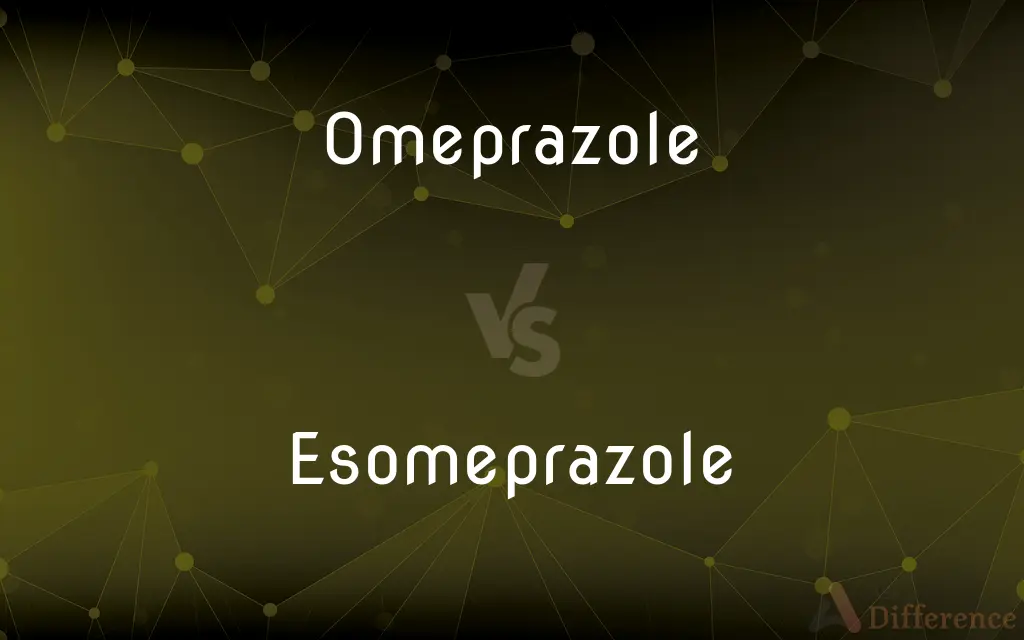Omeprazole vs. Esomeprazole — What's the Difference?
Edited by Tayyaba Rehman — By Fiza Rafique — Updated on March 20, 2024
Omeprazole and esomeprazole are both proton pump inhibitors used to treat acid-related stomach issues, but esomeprazole is a more targeted form, often considered more effective in certain patients.

Difference Between Omeprazole and Esomeprazole
Table of Contents
ADVERTISEMENT
Key Differences
Omeprazole, introduced earlier, is used to treat gastroesophageal reflux disease (GERD), ulcers, and other acid-related conditions. It works by inhibiting the proton pump in stomach lining cells, reducing acid production. Esomeprazole, developed later, is essentially a refined version of omeprazole, specifically the S-enantiomer, which allows for more targeted action and potentially greater efficacy in reducing gastric acid secretion.
While both medications are effective in managing stomach acid-related conditions, esomeprazole has been suggested in some studies to provide more consistent and longer-lasting acid control in certain patient groups. This can be particularly relevant in patients with severe acid reflux or those not fully responsive to omeprazole.
Omeprazole is available in both prescription and over-the-counter forms, making it widely accessible for treating common acid-related issues. Esomeprazole, while also available over-the-counter, might be preferred in specific clinical scenarios requiring more potent acid suppression.
The side effect profiles of omeprazole and esomeprazole are similar, including risks like headache, nausea, and potential long-term effects such as vitamin B12 deficiency or bone fractures with prolonged use. However, individual responses can vary, and some patients may tolerate one medication better than the other.
Given the similarities and differences, the choice between omeprazole and esomeprazole often depends on individual patient needs, the severity of the condition, and the treating physician's experience. Both medications are valuable tools in managing gastrointestinal acid-related disorders, but personalization of treatment is key.
ADVERTISEMENT
Comparison Chart
Mechanism
Proton pump inhibitor
S-enantiomer of omeprazole, more targeted
Conditions Treated
GERD, ulcers, Zollinger-Ellison syndrome
Similar, potentially more effective for severe GERD
Efficacy
Effective in reducing stomach acid
May provide more consistent acid control
Availability
Prescription and over-the-counter
Also available OTC, but might be prescribed for specific cases
Side Effects
Headache, nausea, long-term risks
Similar, but individual tolerability may vary
Compare with Definitions
Omeprazole
Commonly prescribed for GERD and ulcers.
Omeprazole has been a standard treatment for acid reflux for decades.
Esomeprazole
Considered more effective for certain patients.
Esomeprazole may offer better symptom control for some individuals with severe GERD.
Omeprazole
Long history of effective use.
Many patients have successfully managed their acid-related symptoms with omeprazole.
Esomeprazole
May be more expensive due to branding.
The branded version of esomeprazole might be costlier than generic omeprazole.
Omeprazole
Available in both prescription and OTC forms.
You can purchase omeprazole over-the-counter for occasional heartburn.
Esomeprazole
May be preferred in specific clinical scenarios.
Doctors might prescribe esomeprazole for patients not fully responsive to omeprazole.
Omeprazole
Generally more affordable due to its generic availability.
Generic omeprazole is a cost-effective option for long-term management.
Esomeprazole
Potentially greater efficacy in acid suppression.
Esomeprazole's refined action can lead to more consistent stomach acid reduction.
Omeprazole
Flexibility in dosing based on patient response.
Doctors may adjust omeprazole dosage based on the severity of symptoms.
Esomeprazole
Similar side effects but individual differences in tolerability.
Some patients might experience fewer side effects with esomeprazole.
Omeprazole
Omeprazole, sold under the brand names Prilosec and Losec among others, is a medication used in the treatment of gastroesophageal reflux disease (GERD), peptic ulcer disease, and Zollinger–Ellison syndrome. It is also used to prevent upper gastrointestinal bleeding in people who are at high risk.
Esomeprazole
Esomeprazole, sold under the brand name Nexium among others, is a medication which reduces stomach acid. It is used to treat gastroesophageal reflux disease, peptic ulcer disease, and Zollinger–Ellison syndrome.
Omeprazole
A proton pump inhibitor drug, C17H19N3O3S, that suppresses gastric acid secretion and is used for the treatment of duodenal and gastric ulcers and gastroesophageal reflux disease.
Esomeprazole
A proton pump inhibitor drug, C17H19N3O3S, used in the form of its magnesium salt, that suppresses gastric acid secretion and is used for the treatment of duodenal and gastric ulcers and gastroesophageal reflux disease. It is a stereoisomer of omeprazole.
Omeprazole
(pharmaceutical drug) A substituted benzimidazole (trademark Losec, Prilosec) which is a proton pump inhibitor and inhibits secretion of gastric acid, being given orally in the treatment of ulcers and gastroesophageal reflux; 5-methoxy-2-(4-methoxy-3,5-dimethyl-2-pyridylmethylsulfinyl)benzimidazole, C17H19N3O3S.
Esomeprazole
(pharmaceutical drug) An isomer of omeprazole (trademark Nexium) that is administered in the form of its magnesium salt (C17H18N3O3S)2Mg especially in the treatment of erosive esophagitis, gastroesophageal reflux disease, and duodenal ulcer.
Omeprazole
Antacid (trade name Prilosec) that suppresses acid secretion in the stomach
Common Curiosities
Are omeprazole and esomeprazole the same?
They are closely related but not identical; esomeprazole is a more targeted form of omeprazole.
Is esomeprazole better than omeprazole?
Esomeprazole may offer more consistent acid control for some patients, but "better" can vary based on individual response and clinical needs.
Can pregnant or breastfeeding women take omeprazole or esomeprazole?
The use of these medications during pregnancy or breastfeeding should be discussed with a healthcare provider to weigh the benefits and risks.
Can lifestyle changes replace the need for omeprazole or esomeprazole?
While lifestyle changes can significantly benefit acid-related conditions, some individuals may still require medication for adequate symptom control and healing.
What should I do if I miss a dose of omeprazole or esomeprazole?
If a dose is missed, take it as soon as possible unless it's almost time for the next dose; do not double up doses.
Can I switch from omeprazole to esomeprazole on my own?
Any changes between medications should be discussed with a healthcare provider to ensure safety and efficacy.
Are there any long-term risks associated with taking omeprazole or esomeprazole?
Long-term use may be associated with risks like vitamin deficiencies and bone fractures, highlighting the importance of medical supervision.
Can I use omeprazole or esomeprazole for immediate heartburn relief?
These medications are not intended for immediate relief but rather for long-term management of acid-related conditions.
Do omeprazole and esomeprazole interact with other medications?
Yes, they can interact with certain drugs, which is why it's important to inform healthcare providers about all medications being taken.
How long does it take for omeprazole or esomeprazole to work?
These medications may take a few days to start reducing symptoms, with maximum effectiveness typically seen within 4 to 8 weeks.
Are there any natural alternatives to omeprazole and esomeprazole?
Some lifestyle changes and natural remedies may help manage mild symptoms, but they may not be substitutes for these medications in more severe cases.
How should omeprazole or esomeprazole be taken for best results?
They are usually taken before meals, but specific instructions should be followed as provided by a healthcare provider or the medication's labeling.
Are there any foods or drinks to avoid while taking omeprazole or esomeprazole?
It's generally advised to avoid foods and drinks that can worsen acid reflux symptoms, such as spicy foods, alcohol, and caffeine.
Share Your Discovery

Previous Comparison
Spider vs. Centipede
Next Comparison
History vs. LegendAuthor Spotlight
Written by
Fiza RafiqueFiza Rafique is a skilled content writer at AskDifference.com, where she meticulously refines and enhances written pieces. Drawing from her vast editorial expertise, Fiza ensures clarity, accuracy, and precision in every article. Passionate about language, she continually seeks to elevate the quality of content for readers worldwide.
Edited by
Tayyaba RehmanTayyaba Rehman is a distinguished writer, currently serving as a primary contributor to askdifference.com. As a researcher in semantics and etymology, Tayyaba's passion for the complexity of languages and their distinctions has found a perfect home on the platform. Tayyaba delves into the intricacies of language, distinguishing between commonly confused words and phrases, thereby providing clarity for readers worldwide.













































